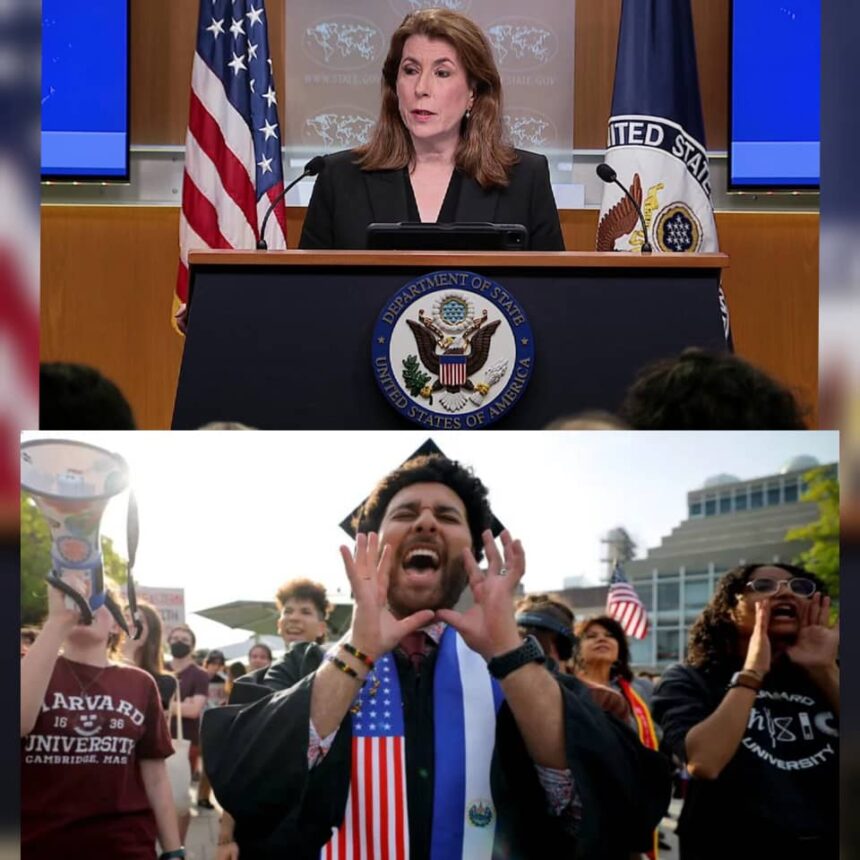As it prepares to intensify social media screening of student visa applicants, the administration of U.S. President Donald Trump has directed American embassies worldwide to suspend new appointments for these visas.
According to an official memo, there will be “significant implications” for embassies and consulates as enhanced social media vetting is introduced for student and foreign exchange visas.
This move aligns with a broader Trump-led crackdown on several of the country’s top universities. The former president has accused these institutions of leaning too far left and failing to adequately address antisemitism during pro-Palestinian demonstrations on campuses.
China has responded by urging the U.S. to uphold the rights of international students.
“We urge the U.S. side to earnestly safeguard the legitimate rights and interests of international students, including those from China,” a spokesperson stated.
U.S. universities host hundreds of thousands of Chinese students, and many institutions depend heavily on the higher tuition fees paid by international students to fund their operations.
Typically, foreign students who wish to study in the U.S. are required to schedule interviews at a U.S. embassy or consulate in their home countries before their applications can be approved.
Speaking to reporters on Tuesday, State Department spokesperson Tammy Bruce said, “We take very seriously the process of vetting who it is that comes into the country, and we’re going to continue to do that.”
The memo, which was obtained by CBS News (the BBC’s U.S. media partner), instructed U.S. embassies to cancel any open appointment slots for student visa applicants—though applicants with existing appointments may proceed.
Secretary of State Marco Rubio stated the pause would remain in effect “until further guidance is issued.”
The memo also indicated an “expansion of required social media screening and vetting” for all student visa applications. However, it did not specify what would be examined during the process.
In March, The Guardian reported that the Trump administration had already stepped up monitoring of student social media activity, linking it to a wider crackdown on campus pro-Palestinian protests.
In April, the U.S. Department of Homeland Security said that “antisemitic activity on social media and the physical harassment of Jewish individuals” could serve as grounds for denying immigration benefits.
As part of the broader crackdown, the Trump administration has frozen hundreds of millions of dollars in university funding, deported international students, and revoked thousands of student visas. Many of these actions have been challenged and halted by the courts.
Several universities have been accused by the White House of allowing antisemitism to take root under the guise of pro-Palestinian activism. In response, academic institutions have accused the Trump administration of attempting to curtail free speech.
Critics argue that the new social media screening measures represent another violation of rights protected under the First Amendment of the U.S. Constitution.
Trump, however, has defended the policy, claiming that he is safeguarding free speech. His administration has specifically targeted Harvard University, freezing $2.65 billion in federal grants and attempting to suspend an additional $100 million in funding.
Harvard’s president warned that such cuts could hurt not only the university but the entire country, as many of the affected scholars are working on high-priority, government-designated research.
Last week, Trump also moved to ban Harvard from admitting foreign researchers or students, a decision that was quickly blocked by a federal judge.
If eventually enforced, the policy could severely impact the university, where over 25% of the student body is international. On Tuesday, students gathered in protest at Harvard’s campus outside Boston.
By Najat Adamu






